From our origins as a weekly Sunday night concert series and photocopied ‘zine to becoming a non-profit institution presenting year-round concerts, festivals, talks and research projects, Wavelength has always put artists and the community first. Dive back into our 20+ years of history supporting emerging artists and local music culture in Toronto and beyond. Timeline written by Jonny Dovercourt.
Pre-History: 1993-1999
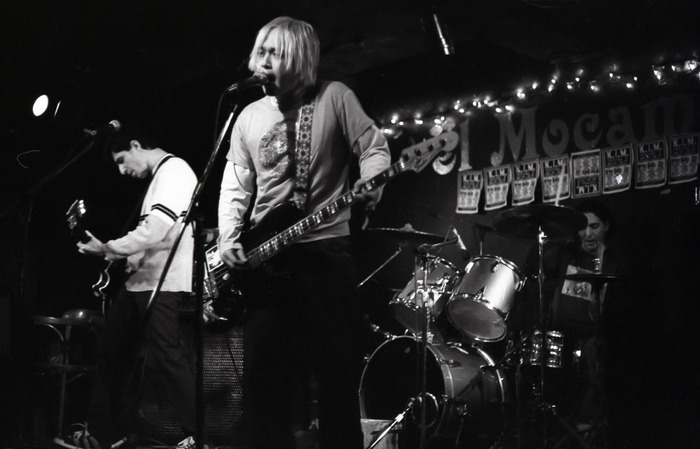
Throughout the ‘90s, Toronto’s local music scene is thriving. Though major labels are out to lunch, a DIY spirit flourishes due to plentiful music venues, affordable living/rehearsal space, and supportive media. Near the end of the decade, a crew of musicians and friends decide to officially form a grassroots artists’ collective to host a weekly Sunday-night concert series accompanied by a monthly print ‘zine and website. They call it: Wavelength.
The Zine Era (2000-2004)
Wavelength launches in February 2000 as a weekly Sunday-night series at cozy second-floor club Ted’s Wrecking Yard in Little Italy. Post-rock and shoegaze bands share stages with free-jazzers and electronic experimentalists. Admission is Pay-What-You-Can and the series is promoted through a photocopied monthly ‘zine that interviews the performers. Soon, Wavelength becomes a social hub for Toronto’s growing indie scene, and hosts key early gigs by Broken Social Scene, Constantines, and Hidden Cameras. Tragedy strikes when Ted’s Wrecking Yard unexpectedly closes in late 2001, but the following year the weekly series moves to College Street nacho palace Sneaky Dee’s, which becomes its longest-running home. 2003-04 sees Canadian bands explode onto the world stage, and Wavelength is swept up in the optimistic era of “Torontopia.” The WL anniversary fest evolves into a multi-venue experience. The ‘zine gets printed in glorious colour, until the Internet takes over.
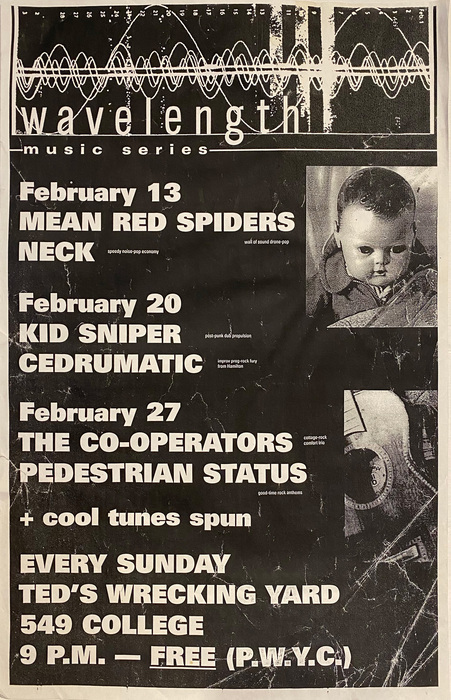
In February, Wavelength begins its weekly residency at Ted’s Wrecking Yard, a 200-capacity second-floor club in Little Italy. The shows bring together diverse groups that might otherwise never play on the same bill, and the unique, artsy vibe is bolstered by irreverent emcee Doc Pickles and psychedelic projection artist General Chaos Visuals. Memorable performances include Peaches’ farewell party celebrating her move to Berlin, a solo acoustic set by New Pornographers offshoot Destroyer, and a solo keyboard set by Kevin Drew as “John Tesh Jr. & the Broken Social Scene.”
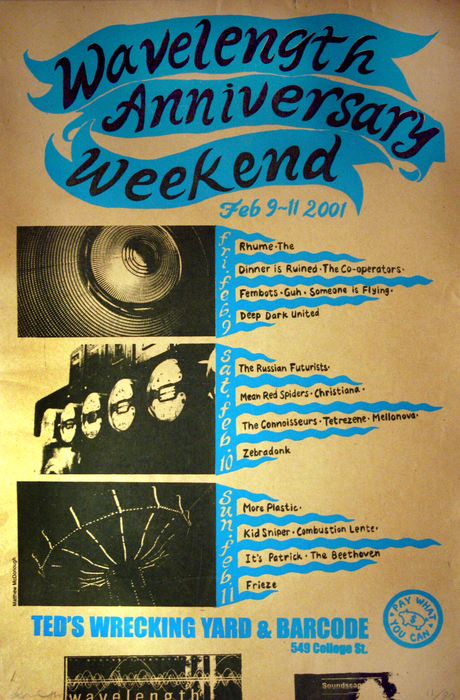
Wavelength celebrates their 1st anniversary and 50th weekly show with Wavelength 50, featuring 19 bands on two stages, and their 1.5th anniversary and 75th weekly show with Wavelength 75, a day-long event. Ted’s Wrecking Yard, their home venue, is shut down in October due to arrears in rent, and Wavelength relocates its Sunday night series to well-established rock club Lee’s Palace in the Annex. Memorable performances include the Constantines playing to a packed house, Sufjan Stevens playing to a dozen people, the Hidden Cameras playing with backup dancers, and Do Make Say Think playing five days after 9/11.
The Internet Era (2005-2009)
The final issue of the Wavelength ‘zine is printed in February 2005, as Wavelength celebrates its fifth birthday, though our inimitable band interviews are still published online. The Toronto music community gathers on the Internet message board Stillepost, and show promotion moves over to nascent social media platforms. In the wake of international indie breakouts, the local music scene grows in strength and diversity, with acts like Cadence Weapon, METZ, Maylee Todd and the Weather Station taking the WL stage. Wavelength begins presenting more special events in alternative spaces outside of Sunday nights at Sneaky Dee’s, and makes steps towards professionalizing, including incorporating as a non-profit. In 2009, an Eye Weekly cover story announces that the upcoming 10th anniversary will mark the end of the weekly series — though it will continue as a monthly in the new decade. That fall, after seven years at Sneak’s, Wavelength finds a new home when the Garrison opens its doors on Dundas West.
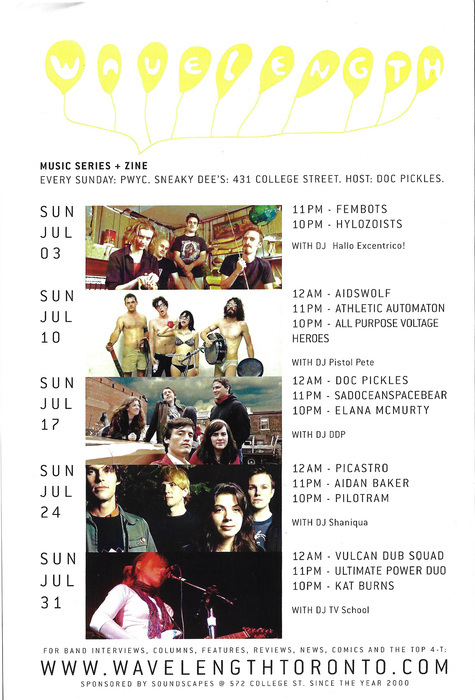
It’s the end of an era: the ‘zine ceases publication on WL’s fifth anniversary due to financial challenges, volunteer burnout, and the relentless rise of social media, though the inimitable WL band interview continues to be published online. Live shows are as packed as ever. Memorable performances include Jens Lekman with a nasty cold, and two sets by a teenage Edmonton rapper called Cadence Weapon, the first after the last-minute cancellation of Ear to the Ground fest at Exhibition Place, and the second alongside Spiral Beach, a band of Toronto high schoolers featuring future members of Moon King, Doldrums, Rapport, Austra, and Crasher.
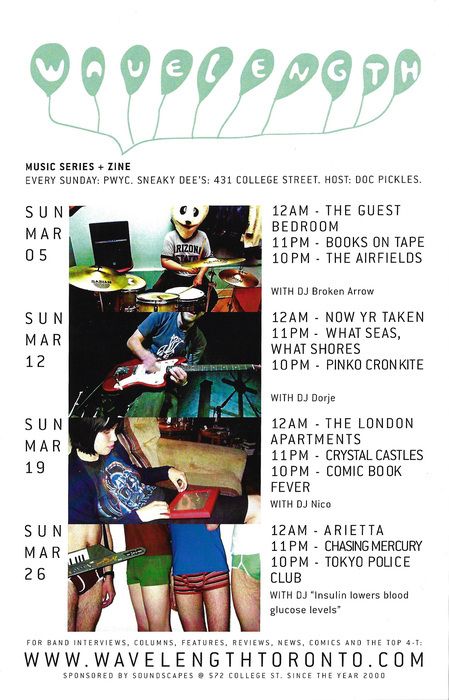
Wavelength takes some tentative steps towards professionalizing, including applying for — anWavelength takes some tentative steps towards professionalizing, including applying for — and receiving — its first Toronto Arts Council grant and hosting its first indie-music panel discussion. The organization also begins to step more outside the confines of Sundays at Sneaky Dee’s, kicking off co-presenting partnerships with Harbourfront Centre, the Images Festival, Mercer Union, and the Music Gallery’s new X Avant Festival. Memorable performances include Crystal Castles and Tokyo Police Club on consecutive weeks right before they both blew up, NYC avant-rock sensations Dirty Projectors, and a new project by a trio of regular WL attendees called the Rural Alberta Advantage. d receiving — its first Toronto Arts Council grant and hosting its first indie-music panel discussion. The organization also begins to step more outside the confines of Sundays at Sneaky Dee's, kicking off co-presenting partnerships with Harbourfront Centre, the Images Festival, Mercer Union, and the Music Gallery’s new X Avant Festival. Memorable performances include Crystal Castles and Tokyo Police Club on consecutive weeks right before they both blew up, NYC avant-rock sensations Dirty Projectors, and a new project by a trio of regular WL attendees called the Rural Alberta Advantage.
The Monthly Era (2010-2014)
Wavelength closes out its epic 10-year run of 500 Sundays with “Wavelength 500,” a five-night blowout at five different venues, alongside a special 10th anniversary edition of the ‘zine. The series continues monthly at the Garrison and other spaces around Toronto — and continues to book new acts before they blow up, such as Grimes, who plays anniversary #11. Wavelength embraces its love of the outdoors by presenting more summer events including the ALL CAPS! Island Festival at Gibraltar Point on Toronto Island — which ramps up with the addition of overnight camping. Wavelength launches an Artist Incubator Program and takes a trio of Toronto bands on tour. And as it reaches the middle of its second decade, the growing organization benefits from professional leadership for the first time.
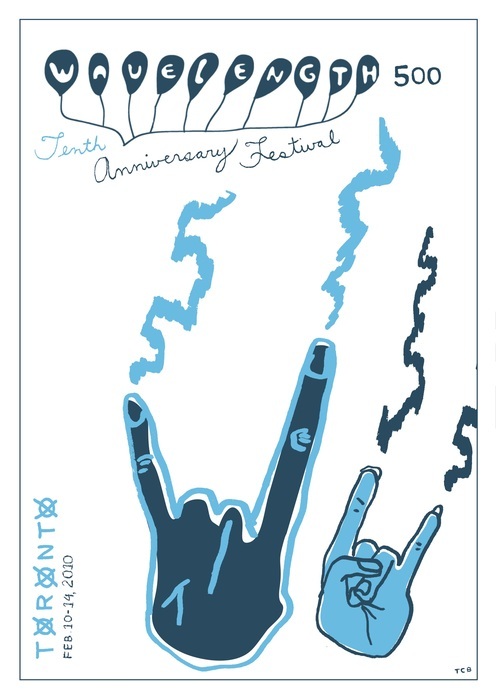
Wavelength 500, our 10th-anniversary fest, is the epic five-night conclusion to the weekly Sunday night series. We publish a special one-off edition of the ‘zine with stories, reflections, and a list of every artist that played the first 10 years, Holy Fuck headlines at Steam Whistle Brewing, past WL regulars reunite, Owen Pallett plays a secret set, and the 2003 lineup of the Hidden Cameras spontaneously close out the fest. From there, the monthly era begins, and Wavelength tests out having a second annual fest in ALL CAPS! Island Festival, a two-day event at Artscape Gibraltar Point on Toronto Island.
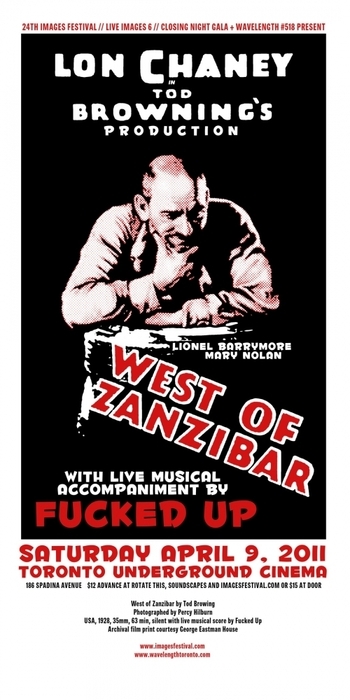
Wavelength continues to embrace its love of being outside in the Toronto summer with Band on the Run, a “musical treasure hunt” consisting of guerilla-style outdoor gigs, while the second ALL CAPS! Island Festival adds a visual arts partnership with Whippersnapper Gallery and a night of camping. Behind the scenes, Wavelength establishes a Board of Directors separate from the programming team. Memorable sets include Grimes opening for Hooded Fang and Maylee Todd at the Great Hall at ELEVEN (WL’s rebranded anniversary festival) months before blowing up, and Fucked Up premiering an original live score to the 1928 silent film West of Zanzibar.
The Festival Era (2015-2019)
Wavelength turns 15 and celebrates its “Past, Present and Future” with a Pop-Up Gallery of show posters and photography at Huntclub Studios on College, hosting a panel discussion on Toronto’s “Music City” moment, continuing the theme at that February’s Winter Festival. Summertime levels up when our Island festival is relaunched as Camp Wavelength — three days of music and camping in an artsy lakeside wonderland. Hip-hop emcee Haviah Mighty and Afro-pop star Pierre Kwenders play the fest before going on to win the Polaris Music Prize. But 2017 sees flooding on Toronto Island force the festival into the city, and Wavelength’s summer festival finds new homes at Fork York and Stackt Market. Our winter festival, meanwhile, gets cozier at the Garrison and year-round Wavelength presents more conceptual concerts, bike tours, library talks, and shows in woodworking studios.
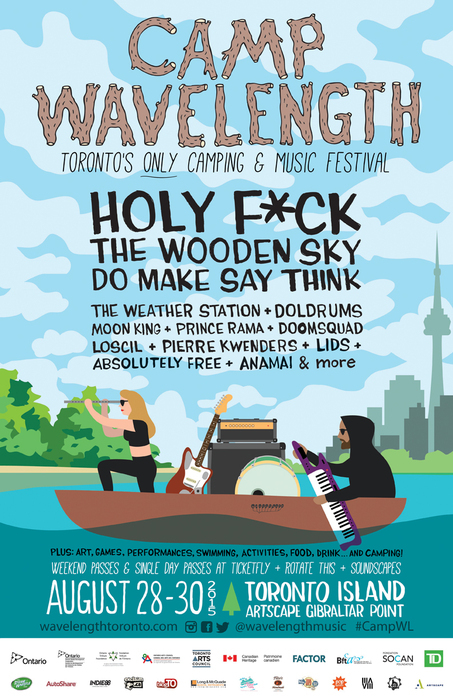
Wavelength Music Festival 15 is themed “Past, Present, and Future,” which defines the organization’s whole year: it starts with a three-week-long Wavelength Pop-Up Gallery with a historical poster and photo show, window art, community concerts, workshops, and talks; each of the annual fest’s three nights embodies one of the categories; and the first Camp Wavelength fest on the Island has three days of shows, two nights of camping, and one giant artsy wonderland. Notable performances include Canadian punk pioneer (and later Order of Canada recipient) Art Bergmann at the “Past” night of the fest, and a 50th-anniversary celebration for noise legends the Nihilist Spasm Band.
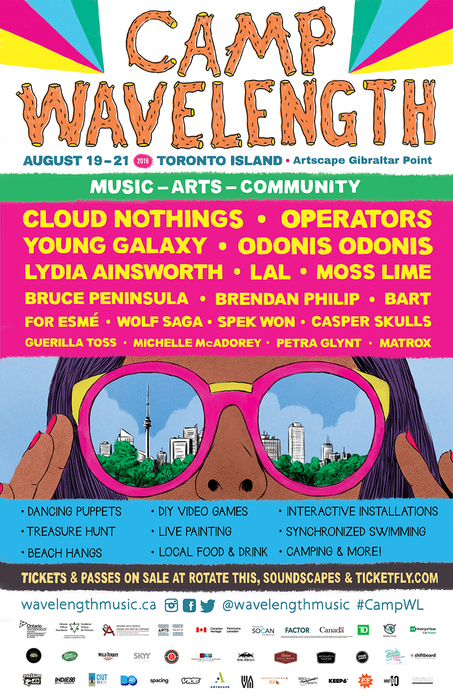
Wavelength’s Sweet 16 kicks off with a New Year’s Eve party in Mirvish Village, and Wavelength Music Festival 16 tightens up the format by hosting three nights of shows at one home base, the Garrison. Come August, it’s back to the Island for the second edition of Camp Wavelength. The music is great, the art is dazzling, and the stories are legendary. Other memorable moments include a team-up with Manifesto to bring together hip-hop, indie, R&B and electronica with pHoenix Pagliacci, Language Arts, Obuxum and more, and “Don’t Speak,” a conceptual concert of ambient music, where talking is forbidden and guests must communicate through handwritten notes.
The R&D Era (2020-2024)
Little do we know that the momentous, five-night celebration of Wavelength’s 20th anniversary in Feb. 2020 — including a one-night return to our former Sunday night home Sneaky Dee’s — will be one of the last in-person music festivals in Toronto before COVID-19. The pandemic shuts down all live music in Ontario for 18 months, but Wavelength makes the most of the spare time, presenting ever more creative livestream concerts and talks, while organizing our archives behind the scenes and launching new research projects, including “Reimagining Music Venues.” In-person events return with the “TOPS x Wavelength” film and music series at Fort York over Labour Day weekend 2021. A year later, we relaunch our summer festivities as the Wavelength Summer Thing, which then moves to a fantastic new waterfront location at Trillium Park in 2023.
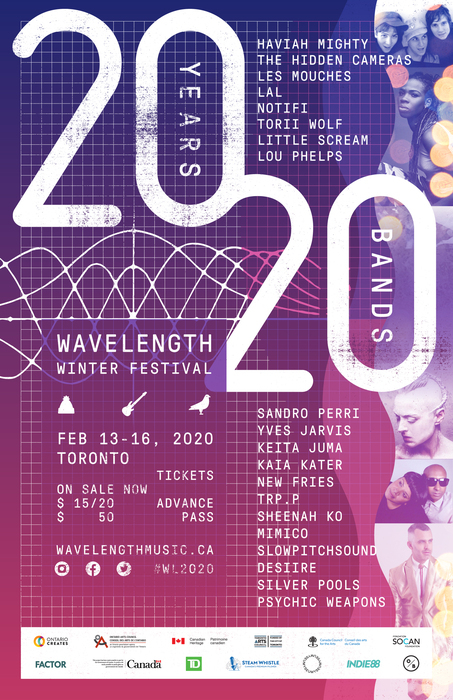
The year starts off as a momentous one, marking our 20th anniversary with the four-night Wavelength Winter Festival 2020. The opening night at Sneaky Dee’s (20 years to the day from WL 1) feels like a high school reunion for long-time showgoers, complete with commemorative ‘zine. No one knows that #WL2020 will be the last in-person music festival in Toronto before the COVID-19 pandemic. We spend the rest of the year sorting through our archives and making the most of livestreaming, like Rapport playing live from their living room (with their bassist socially distanced on the porch) and the Wavelength 800 Livestream Mini-Fest.
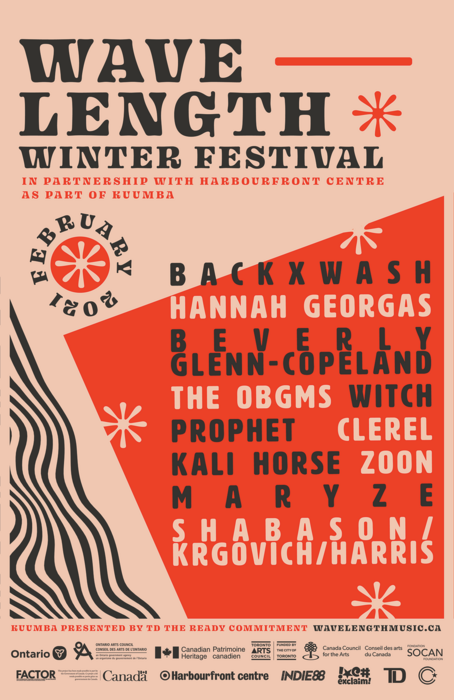
Though it’s still firmly mid-pandemic, 2021 starts off on a hopeful note with the rollout of COVID vaccines in Canada and the fully online 21st Wavelength Winter Festival. Wavelength returns to in-person programming in September with TOPS x Wavelength, five days of live music and film co-presented with the Toronto Outdoor Picture Show at Fort York, and two sold-out, restricted-capacity shows at 918 Bathurst. Memorable moments include soul singer Odario livestreaming from Union Sound Co. in an online double bill with underground rap hero More Or Les, and Brendan Canning DJing virtual concert simulation Waveworld.
